动词的时态和语态(综合测试)-2025年中考英语一轮复习练习
文档属性
| 名称 | 动词的时态和语态(综合测试)-2025年中考英语一轮复习练习 | 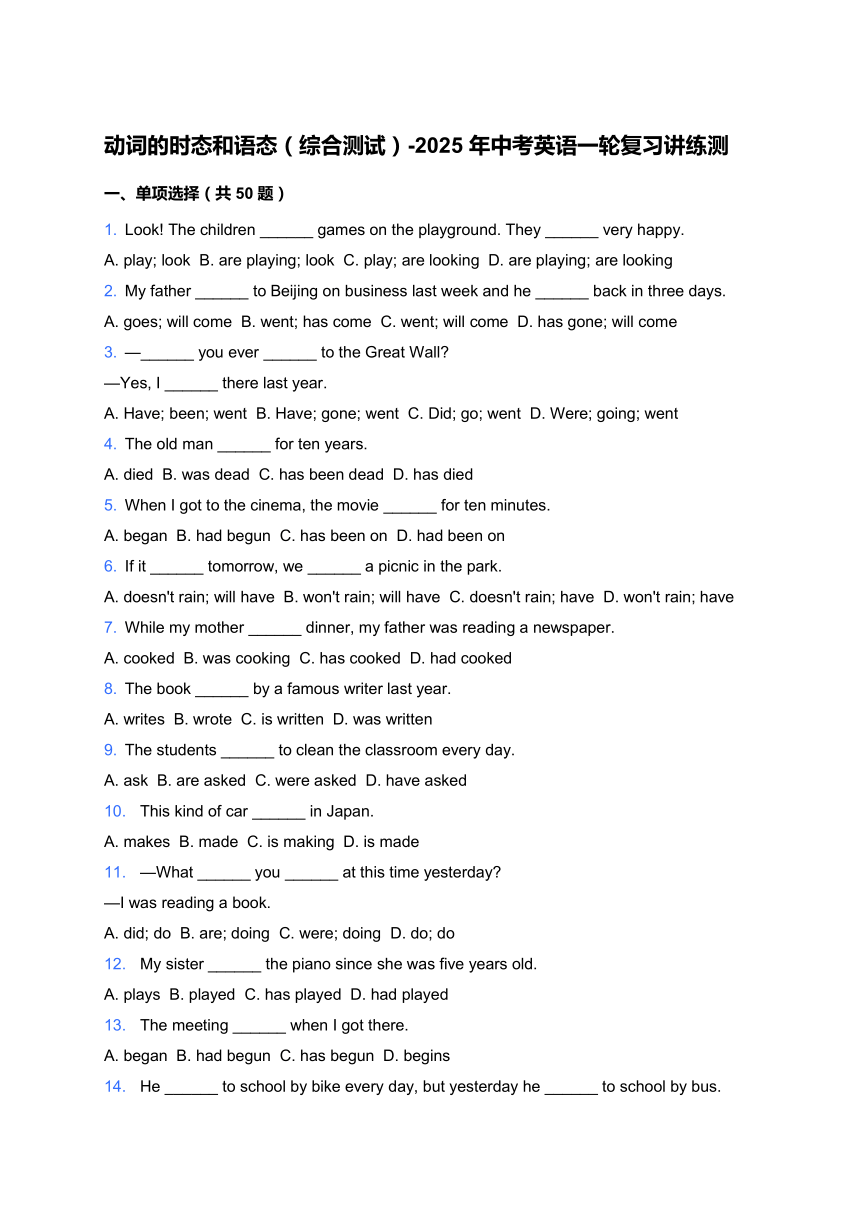 | |
| 格式 | docx | ||
| 文件大小 | 22.0KB | ||
| 资源类型 | 教案 | ||
| 版本资源 | 人教新目标(Go for it)版 | ||
| 科目 | 英语 | ||
| 更新时间 | 2025-02-13 19:37:02 | ||
图片预览

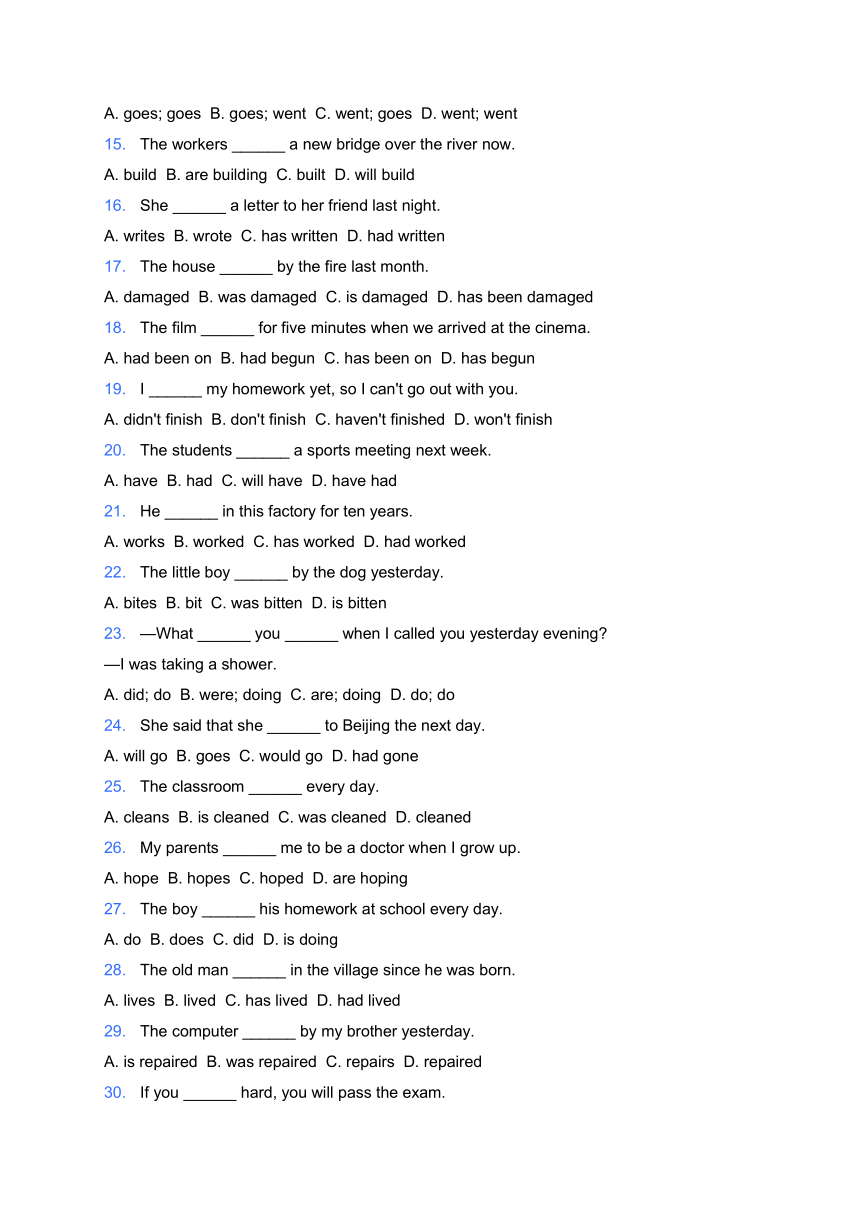
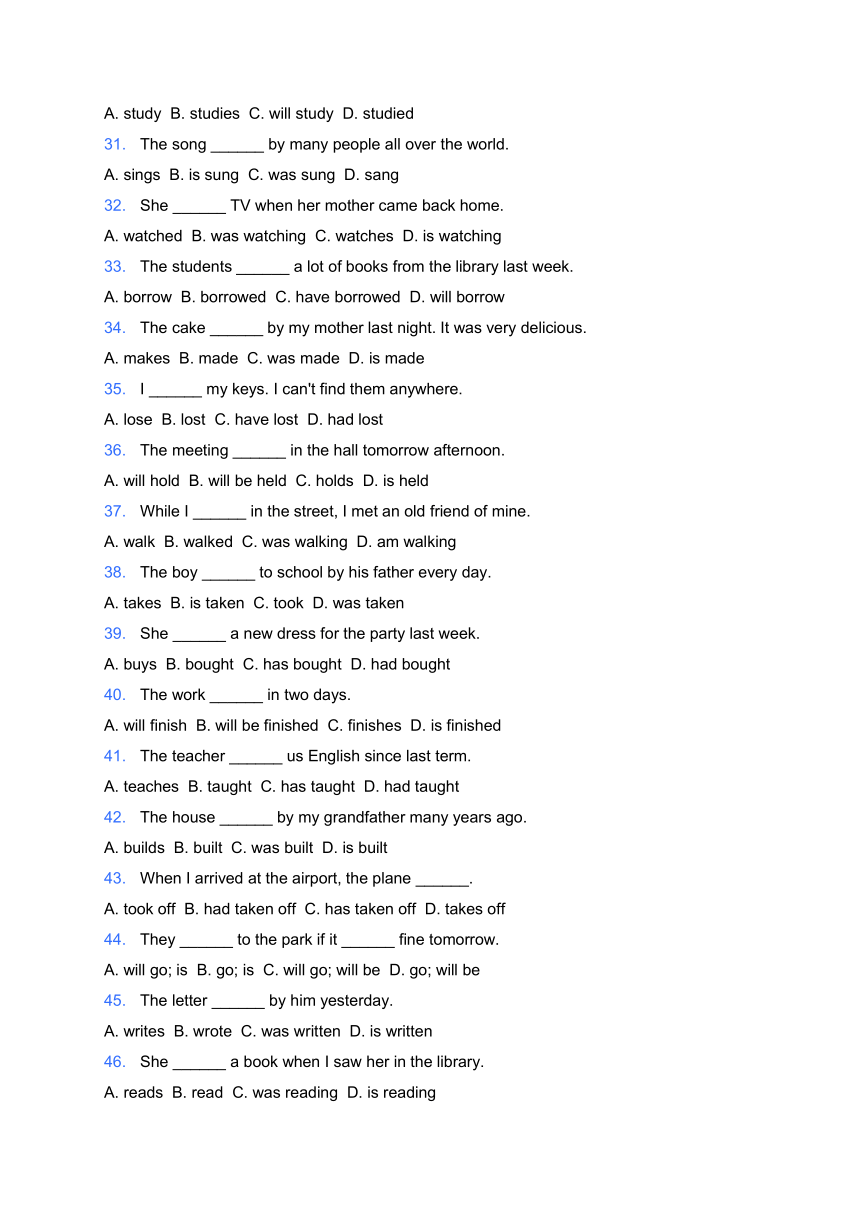
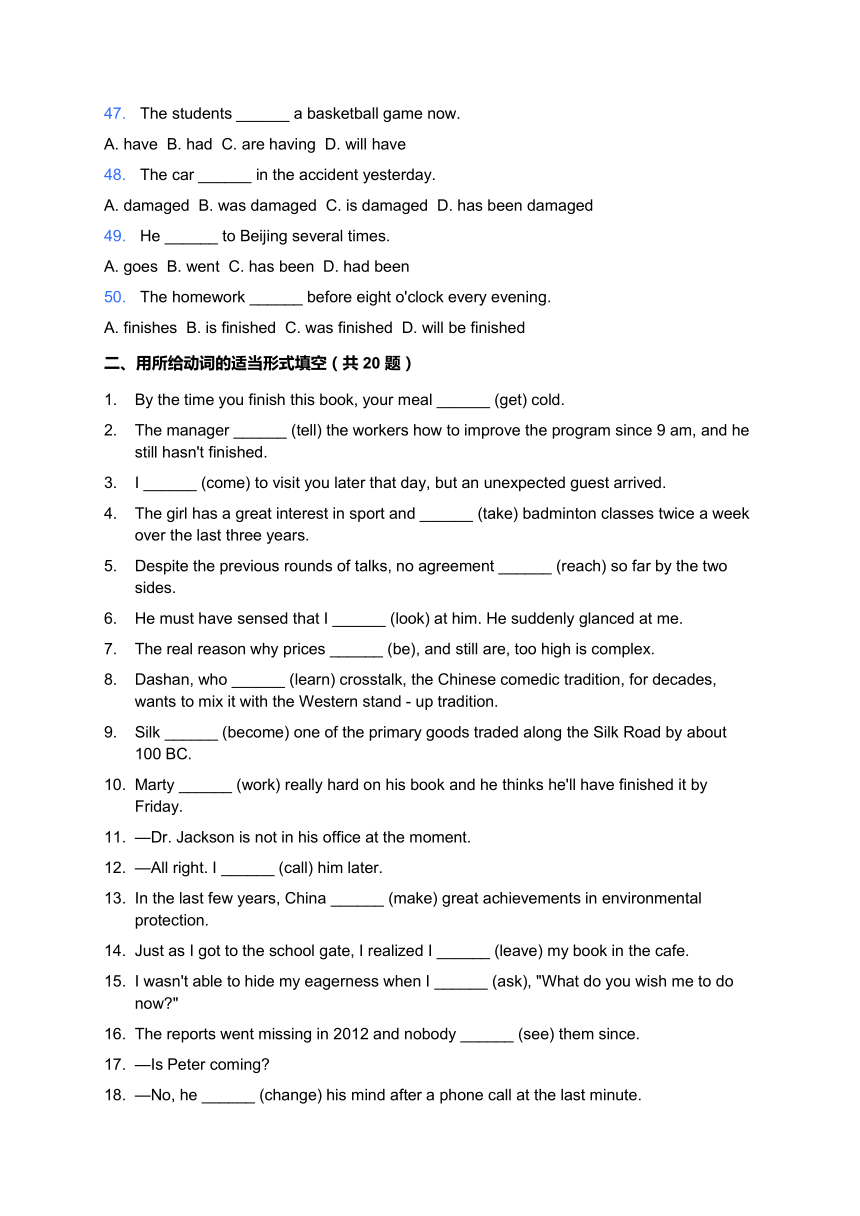
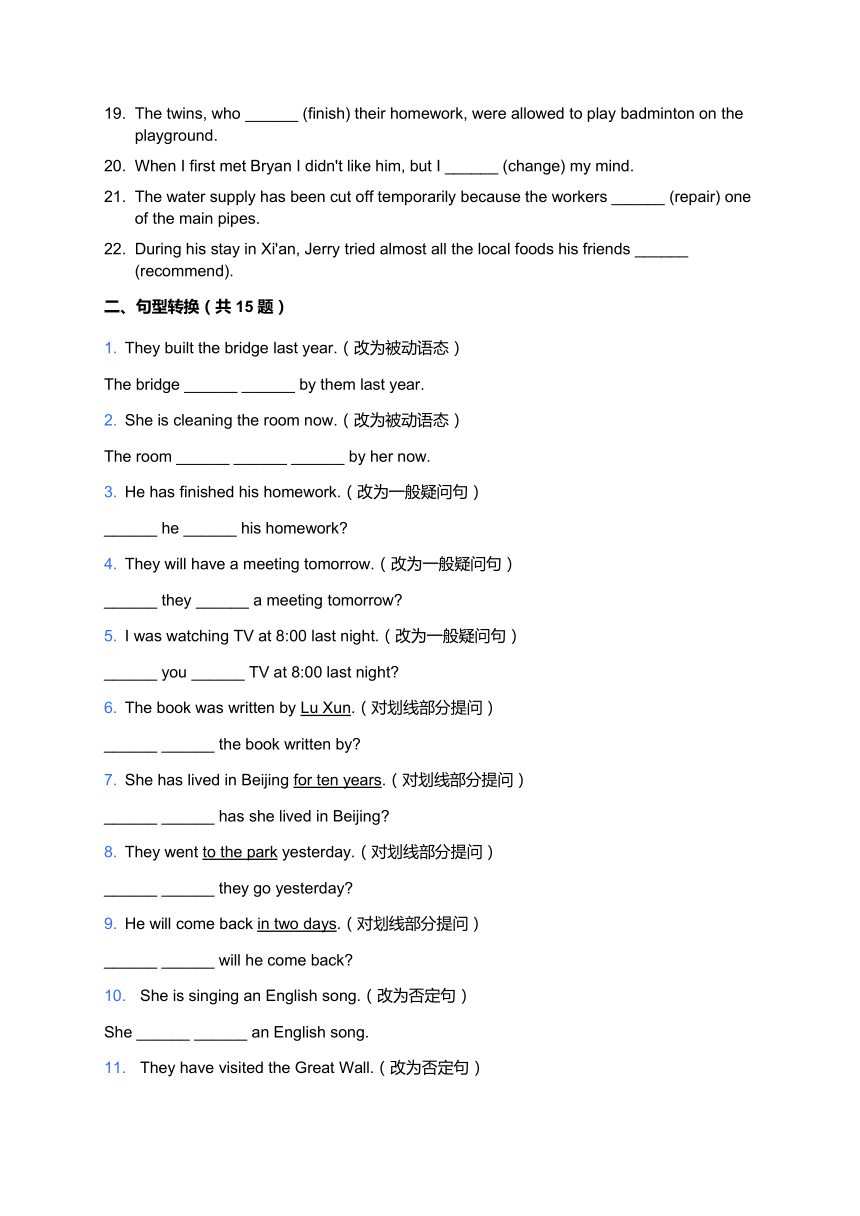
文档简介
动词的时态和语态(综合测试)-2025 年中考英语一轮复习讲练测
一、单项选择(共 50 题)
Look! The children ______ games on the playground. They ______ very happy.
A. play; look B. are playing; look C. play; are looking D. are playing; are looking
My father ______ to Beijing on business last week and he ______ back in three days.
A. goes; will come B. went; has come C. went; will come D. has gone; will come
—______ you ever ______ to the Great Wall
—Yes, I ______ there last year.
A. Have; been; went B. Have; gone; went C. Did; go; went D. Were; going; went
The old man ______ for ten years.
A. died B. was dead C. has been dead D. has died
When I got to the cinema, the movie ______ for ten minutes.
A. began B. had begun C. has been on D. had been on
If it ______ tomorrow, we ______ a picnic in the park.
A. doesn't rain; will have B. won't rain; will have C. doesn't rain; have D. won't rain; have
While my mother ______ dinner, my father was reading a newspaper.
A. cooked B. was cooking C. has cooked D. had cooked
The book ______ by a famous writer last year.
A. writes B. wrote C. is written D. was written
The students ______ to clean the classroom every day.
A. ask B. are asked C. were asked D. have asked
This kind of car ______ in Japan.
A. makes B. made C. is making D. is made
—What ______ you ______ at this time yesterday
—I was reading a book.
A. did; do B. are; doing C. were; doing D. do; do
My sister ______ the piano since she was five years old.
A. plays B. played C. has played D. had played
The meeting ______ when I got there.
A. began B. had begun C. has begun D. begins
He ______ to school by bike every day, but yesterday he ______ to school by bus.
A. goes; goes B. goes; went C. went; goes D. went; went
The workers ______ a new bridge over the river now.
A. build B. are building C. built D. will build
She ______ a letter to her friend last night.
A. writes B. wrote C. has written D. had written
The house ______ by the fire last month.
A. damaged B. was damaged C. is damaged D. has been damaged
The film ______ for five minutes when we arrived at the cinema.
A. had been on B. had begun C. has been on D. has begun
I ______ my homework yet, so I can't go out with you.
A. didn't finish B. don't finish C. haven't finished D. won't finish
The students ______ a sports meeting next week.
A. have B. had C. will have D. have had
He ______ in this factory for ten years.
A. works B. worked C. has worked D. had worked
The little boy ______ by the dog yesterday.
A. bites B. bit C. was bitten D. is bitten
—What ______ you ______ when I called you yesterday evening
—I was taking a shower.
A. did; do B. were; doing C. are; doing D. do; do
She said that she ______ to Beijing the next day.
A. will go B. goes C. would go D. had gone
The classroom ______ every day.
A. cleans B. is cleaned C. was cleaned D. cleaned
My parents ______ me to be a doctor when I grow up.
A. hope B. hopes C. hoped D. are hoping
The boy ______ his homework at school every day.
A. do B. does C. did D. is doing
The old man ______ in the village since he was born.
A. lives B. lived C. has lived D. had lived
The computer ______ by my brother yesterday.
A. is repaired B. was repaired C. repairs D. repaired
If you ______ hard, you will pass the exam.
A. study B. studies C. will study D. studied
The song ______ by many people all over the world.
A. sings B. is sung C. was sung D. sang
She ______ TV when her mother came back home.
A. watched B. was watching C. watches D. is watching
The students ______ a lot of books from the library last week.
A. borrow B. borrowed C. have borrowed D. will borrow
The cake ______ by my mother last night. It was very delicious.
A. makes B. made C. was made D. is made
I ______ my keys. I can't find them anywhere.
A. lose B. lost C. have lost D. had lost
The meeting ______ in the hall tomorrow afternoon.
A. will hold B. will be held C. holds D. is held
While I ______ in the street, I met an old friend of mine.
A. walk B. walked C. was walking D. am walking
The boy ______ to school by his father every day.
A. takes B. is taken C. took D. was taken
She ______ a new dress for the party last week.
A. buys B. bought C. has bought D. had bought
The work ______ in two days.
A. will finish B. will be finished C. finishes D. is finished
The teacher ______ us English since last term.
A. teaches B. taught C. has taught D. had taught
The house ______ by my grandfather many years ago.
A. builds B. built C. was built D. is built
When I arrived at the airport, the plane ______.
A. took off B. had taken off C. has taken off D. takes off
They ______ to the park if it ______ fine tomorrow.
A. will go; is B. go; is C. will go; will be D. go; will be
The letter ______ by him yesterday.
A. writes B. wrote C. was written D. is written
She ______ a book when I saw her in the library.
A. reads B. read C. was reading D. is reading
The students ______ a basketball game now.
A. have B. had C. are having D. will have
The car ______ in the accident yesterday.
A. damaged B. was damaged C. is damaged D. has been damaged
He ______ to Beijing several times.
A. goes B. went C. has been D. had been
The homework ______ before eight o'clock every evening.
A. finishes B. is finished C. was finished D. will be finished
二、用所给动词的适当形式填空(共 20 题)
By the time you finish this book, your meal ______ (get) cold.
The manager ______ (tell) the workers how to improve the program since 9 am, and he still hasn't finished.
I ______ (come) to visit you later that day, but an unexpected guest arrived.
The girl has a great interest in sport and ______ (take) badminton classes twice a week over the last three years.
Despite the previous rounds of talks, no agreement ______ (reach) so far by the two sides.
He must have sensed that I ______ (look) at him. He suddenly glanced at me.
The real reason why prices ______ (be), and still are, too high is complex.
Dashan, who ______ (learn) crosstalk, the Chinese comedic tradition, for decades, wants to mix it with the Western stand - up tradition.
Silk ______ (become) one of the primary goods traded along the Silk Road by about 100 BC.
Marty ______ (work) really hard on his book and he thinks he'll have finished it by Friday.
—Dr. Jackson is not in his office at the moment.
—All right. I ______ (call) him later.
In the last few years, China ______ (make) great achievements in environmental protection.
Just as I got to the school gate, I realized I ______ (leave) my book in the cafe.
I wasn't able to hide my eagerness when I ______ (ask), "What do you wish me to do now "
The reports went missing in 2012 and nobody ______ (see) them since.
—Is Peter coming
—No, he ______ (change) his mind after a phone call at the last minute.
The twins, who ______ (finish) their homework, were allowed to play badminton on the playground.
When I first met Bryan I didn't like him, but I ______ (change) my mind.
The water supply has been cut off temporarily because the workers ______ (repair) one of the main pipes.
During his stay in Xi'an, Jerry tried almost all the local foods his friends ______ (recommend).
二、句型转换(共 15 题)
They built the bridge last year.(改为被动语态)
The bridge ______ ______ by them last year.
She is cleaning the room now.(改为被动语态)
The room ______ ______ ______ by her now.
He has finished his homework.(改为一般疑问句)
______ he ______ his homework
They will have a meeting tomorrow.(改为一般疑问句)
______ they ______ a meeting tomorrow
I was watching TV at 8:00 last night.(改为一般疑问句)
______ you ______ TV at 8:00 last night
The book was written by Lu Xun.(对划线部分提问)
______ ______ the book written by
She has lived in Beijing for ten years.(对划线部分提问)
______ ______ has she lived in Beijing
They went to the park yesterday.(对划线部分提问)
______ ______ they go yesterday
He will come back in two days.(对划线部分提问)
______ ______ will he come back
She is singing an English song.(改为否定句)
She ______ ______ an English song.
They have visited the Great Wall.(改为否定句)
They ______ ______ the Great Wall.
He did his homework last night.(改为否定句)
He ______ ______ his homework last night.
The meeting will be held in the hall.(对划线部分提问)
______ ______ the meeting be held
She was reading a book when I came in.(对划线部分提问)
______ was she ______ when you came in
The car was made in Japan.(对划线部分提问)
______ ______ the car made
三、汉译英(共 15 题)
到下个月底,我们将已经完成这个项目。
By the end of next month, we ______ ______ ______ the project.
他一直在努力学习英语,为即将到来的考试做准备。
He ______ ______ ______ hard at English to prepare for the coming exam.
昨天这个时候,我正在做实验。
I ______ ______ the experiment at this time yesterday.
这座城市在过去的十年里发生了巨大的变化。
Great changes ______ ______ place in this city in the past ten years.
这些书是由一位著名作家写的。
These books ______ ______ by a famous writer.
会议将在明天上午举行。
The meeting ______ ______ ______ tomorrow morning.
当我到达车站时,火车已经离开了。
When I arrived at the station, the train ______ ______.
她告诉我她以前见过这部电影。
She told me that she ______ ______ the film before.
如果你努力学习,你就会取得进步。
If you ______ hard, you ______ ______ progress
这个问题正在被讨论。
The problem ______ ______ ______ now.
他说他下周要去上海。
He said that he ______ ______ to Shanghai next week.
我已经等了他两个小时了。
I ______ ______ for him for two hours.
那座旧桥是 50 年前建造的。
That old bridge ______ ______ fifty years ago.
直到他妈妈回来,他才上床睡觉。
He ______ go to bed ______ his mother came back.
她正在做作业的时候,突然听到了一声巨响。
She ______ ______ her homework when she suddenly heard a loud noise.
单项选择答案:
B。look 是现在进行时的标志词,第一空用 are playing;look 在此处是系动词,无进行时态,第二空用 look。
C。last week 是一般过去时标志,第一空用 went;in three days 是一般将来时标志,第二空用 will come。
A。ever 是现在完成时标志,have been to 表示 “去过已回”,have gone to 表示 “去了未回”,第一空用 Have; been;last year 是一般过去时标志,第二空用 went。
C。for ten years 是现在完成时标志,且 die 是短暂性动词,要变为延续性动词 be dead,所以用 has been dead。
D。“got to” 是过去时,电影在 “我到达” 之前就开始了,是 “过去的过去”,用过去完成时,且 begin 是短暂性动词,要变为延续性动词 be on,所以用 had been on。
A。if 引导的条件状语从句,遵循 “主将从现” 原则,从句用 doesn't rain,主句用 will have。
B。while 引导的时间状语从句,强调两个动作同时进行,用过去进行时,所以用 was cooking。
D。last year 是一般过去时标志,且 book 和 write 是被动关系,用一般过去时的被动语态 was written。
B。every day 是一般现在时标志,students 和 ask 是被动关系,用一般现在时的被动语态 are asked。
D。描述事实,用一般现在时,car 和 make 是被动关系,用一般现在时的被动语态 is made。
C。at this time yesterday 是过去进行时标志,用 were; doing。
C。since she was five years old 是现在完成时标志,用 has played。
B。“got there” 是过去时,会议在 “我到达” 之前就开始了,是 “过去的过去”,用过去完成时 had begun。
B。every day 是一般现在时标志,第一空用 goes;yesterday 是一般过去时标志,第二空用 went。
B。now 是现在进行时标志,用 are building。
B。last night 是一般过去时标志,用 wrote。
B。last month 是一般过去时标志,house 和 damage 是被动关系,用一般过去时的被动语态 was damaged。
A。“arrived” 是过去时,电影在 “我们到达” 之前就开始了,是 “过去的过去”,用过去完成时,且 begin 是短暂性动词,要变为延续性动词 be on,所以用 had been on。
C。yet 是现在完成时标志,用 haven't finished。
C。next week 是一般将来时标志,用 will have。
C。for ten years 是现在完成时标志,用 has worked。
C。yesterday 是一般过去时标志,boy 和 bite 是被动关系,用一般过去时的被动语态 was bitten。
B。when 引导的时间状语从句,“called” 是过去时,此处强调过去某个时间点正在进行的动作,用过去进行时 were; doing。
C。主句是一般过去时,宾语从句要用相应的过去时态,the next day 表示将来,所以用过去将来时 would go。
B。every day 是一般现在时标志,classroom 和 clean 是被动关系,用一般现在时的被动语态 is cleaned。
A。陈述事实,用一般现在时,主语是复数,用 hope。
B。every day 是一般现在时标志,主语是第三人称单数,用 does。
C。since he was born 是现在完成时标志,用 has lived。
B。yesterday 是一般过去时标志,computer 和 repair 是被动关系,用一般过去时的被动语态 was repaired。
A。if 引导的条件状语从句,遵循 “主将从现” 原则,从句用 study。
B。描述事实,用一般现在时,song 和 sing 是被动关系,用一般现在时的被动语态 is sung。
B。when 引导的时间状语从句,“came back” 是过去时,此处强调过去某个时间点正在进行的动作,用过去进行时 was watching。
B。last week 是一般过去时标志,用 borrowed。
C。last night 是一般过去时标志,cake 和 make 是被动关系,用一般过去时的被动语态 was made。
C。强调对现在造成的影响 “找不到钥匙”,用现在完成时 have lost。
B。tomorrow afternoon 是一般将来时标志,meeting 和 hold 是被动关系,用一般将来时的被动语态 will be held。
C。while 引导的时间状语从句,强调两个动作同时进行,用过去进行时,所以用 was walking。
B。every day 是一般现在时标志,boy 和 take 是被动关系,用一般现在时的被动语态 is taken。
B。last week 是一般过去时标志,用 bought。
B。in two days 是一般将来时标志,work 和 finish 是被动关系,用一般将来时的被动语态 will be finished。
C。since last term 是现在完成时标志,用 has taught。
C。many years ago 是一般过去时标志,house 和 build 是被动关系,用一般过去时的被动语态 was built。
B。“arrived” 是过去时,飞机在 “我到达” 之前就起飞了,是 “过去的过去”,用过去完成时 had taken off。
A。if 引导的条件状语从句,遵循 “主将从现” 原则,从句用 is,主句用 will go。
C。yesterday 是一般过去时标志,letter 和 write 是被动关系,用一般过去时的被动语态 was written。
C。when 引导的时间状语从句,“saw” 是过去时,此处强调过去某个时间点正在进行的动作,用过去进行时 was reading。
C。now 是现在进行时标志,用 are having。
B。yesterday 是一般过去时标志,car 和 damage 是被动关系,用一般过去时的被动语态 was damaged。
C。强调 “去过几次”,用现在完成时 has been。
B。every evening 是一般现在时标志,homework 和 finish 是被动关系,用一般现在时的被动语态 is finished。
二答案:
will have got。“by the time + 一般现在时” 引导时间状语从句,主句用将来完成时,表示在将来某个时间点之前已经完成的动作。
has been telling。“since 9 am” 表示从过去一直持续到现在,且 “he still hasn't finished” 表明动作还在进行,所以用现在完成进行时。
was coming。用过去进行时表示过去将来的动作,原本打算那天晚些时候去拜访。
has been taking。“over the last three years” 是现在完成进行时的标志,强调动作从过去开始一直持续到现在,并且可能继续下去。
has been reached。“so far” 是现在完成时的标志,“agreement” 与 “reach” 是被动关系,所以用现在完成时的被动语态。
was looking。根据 “He suddenly glanced at me” 可知,当时 “我” 正在看他,用过去进行时。
were。and 连接两个并列的情况,后面是 “and still are”,前面表示过去的情况,用一般过去时。
has been learning。“for decades” 表示动作持续了几十年,用现在完成进行时强调动作的持续性。
had become。“by about 100 BC” 表示 “到公元前 100 年左右”,是过去的过去,用过去完成时。
has been working。“he thinks he'll have finished it by Friday” 表明从过去到现在一直在努力写书,用现在完成进行时。
will call。“later” 表示将来,用一般将来时。
has made。“in the last few years” 是现在完成时的标志,中国在过去几年取得了成就。
had left。“realized” 是过去时,“把书落在咖啡馆” 发生在 “意识到” 之前,即过去的过去,用过去完成时。
asked。“wasn't” 表明是过去的情况,用一般过去时。
has seen。“since” 是现在完成时的标志,从 2012 年到现在没人见过那些报告。
changed。“at the last minute” 是过去的时间点,用一般过去时。
had finished。“were allowed” 是过去时,“完成作业” 发生在 “被允许去操场” 之前,用过去完成时。
have changed。“When I first met Bryan I didn't like him” 是过去的情况,现在改变了想法,强调对现在的影响,用现在完成时。
are repairing。“has been cut off temporarily” 表明现在供水被切断,因为工人正在修理主管道,用现在进行时。
had recommended。“tried” 是过去时,“朋友推荐食物” 发生在 “尝试食物” 之前,用过去完成时。
三答案:
was built。一般过去时的被动语态结构为 “was/were + 过去分词”,主语 “the bridge” 是单数,用 was built。
is being cleaned。现在进行时的被动语态结构为 “am/is/are + being + 过去分词”,主语 “the room” 是单数,用 is being cleaned。
Has; finished。现在完成时的一般疑问句,将助动词 has 提前。
Will; have。一般将来时的一般疑问句,将助动词 will 提前。
Were; watching。过去进行时的一般疑问句,将 were 提前。
Who was。对动作执行者提问,用 who,原句是一般过去时的被动语态,所以是 Who was。
How long。对 “for + 时间段” 提问,用 how long。
Where did。对地点提问,用 where,原句是一般过去时,借助助动词 did。
How soon。对 “in + 时间段” 提问,用 how soon,表示 “多久以后”。
isn't singing。现在进行时的否定句,在 be 动词后加 not,is not 缩写为 isn't。
haven't visited。现在完成时的否定句,在助动词 have 后加 not,have not 缩写为 haven't。
didn't do。一般过去时的否定句,借助助动词 didn't,后面的动词用原形。
Where will。对地点提问,用 where,原句是一般将来时的被动语态,将 will 提前。
What; doing。对动作提问,用 what,原句是过去进行时,用 What was she doing。
Where was。对地点提问,用 where,原句是一般过去时的被动语态,所以是 Where was。
四答案:
will have completed。“by the end of next month” 是将来完成时的标志,用 will have done 结构。
has been studying。表示从过去一直持续到现在,并且还在进行的动作,用现在完成进行时。
was doing。“at this time yesterday” 是过去进行时的标志,用 was/were doing 结构。
have taken。“in the past ten years” 是现在完成时的标志,take place 无被动语态。
were written。“书” 和 “写” 是被动关系,用一般过去时的被动语态。
will be held。“会议” 和 “举行” 是被动关系,“tomorrow morning” 是将来时间,用一般将来时的被动语态。
had left。“arrived” 是过去时,“火车离开” 发生在 “到达” 之前,用过去完成时。
had seen。“told” 是过去时,“见过电影” 发生在 “告诉” 之前,用过去完成时。
study; will make。if 引导的条件状语从句,遵循 “主将从现” 原则。
is being discussed。“现在正在被讨论”,用现在进行时的被动语态。
would go。主句是一般过去时,宾语从句要用相应的过去时态,“next week” 表示将来,用过去将来时。
have been waiting。“for two hours” 表示动作持续了两个小时,用现在完成进行时。
was built。“50 年前建造”,用一般过去时的被动语态。
didn't; until。“not... until...” 表示 “直到…… 才……”,原句是一般过去时。
was doing。“正在做作业的时候”,用过去进行时。
一、单项选择(共 50 题)
Look! The children ______ games on the playground. They ______ very happy.
A. play; look B. are playing; look C. play; are looking D. are playing; are looking
My father ______ to Beijing on business last week and he ______ back in three days.
A. goes; will come B. went; has come C. went; will come D. has gone; will come
—______ you ever ______ to the Great Wall
—Yes, I ______ there last year.
A. Have; been; went B. Have; gone; went C. Did; go; went D. Were; going; went
The old man ______ for ten years.
A. died B. was dead C. has been dead D. has died
When I got to the cinema, the movie ______ for ten minutes.
A. began B. had begun C. has been on D. had been on
If it ______ tomorrow, we ______ a picnic in the park.
A. doesn't rain; will have B. won't rain; will have C. doesn't rain; have D. won't rain; have
While my mother ______ dinner, my father was reading a newspaper.
A. cooked B. was cooking C. has cooked D. had cooked
The book ______ by a famous writer last year.
A. writes B. wrote C. is written D. was written
The students ______ to clean the classroom every day.
A. ask B. are asked C. were asked D. have asked
This kind of car ______ in Japan.
A. makes B. made C. is making D. is made
—What ______ you ______ at this time yesterday
—I was reading a book.
A. did; do B. are; doing C. were; doing D. do; do
My sister ______ the piano since she was five years old.
A. plays B. played C. has played D. had played
The meeting ______ when I got there.
A. began B. had begun C. has begun D. begins
He ______ to school by bike every day, but yesterday he ______ to school by bus.
A. goes; goes B. goes; went C. went; goes D. went; went
The workers ______ a new bridge over the river now.
A. build B. are building C. built D. will build
She ______ a letter to her friend last night.
A. writes B. wrote C. has written D. had written
The house ______ by the fire last month.
A. damaged B. was damaged C. is damaged D. has been damaged
The film ______ for five minutes when we arrived at the cinema.
A. had been on B. had begun C. has been on D. has begun
I ______ my homework yet, so I can't go out with you.
A. didn't finish B. don't finish C. haven't finished D. won't finish
The students ______ a sports meeting next week.
A. have B. had C. will have D. have had
He ______ in this factory for ten years.
A. works B. worked C. has worked D. had worked
The little boy ______ by the dog yesterday.
A. bites B. bit C. was bitten D. is bitten
—What ______ you ______ when I called you yesterday evening
—I was taking a shower.
A. did; do B. were; doing C. are; doing D. do; do
She said that she ______ to Beijing the next day.
A. will go B. goes C. would go D. had gone
The classroom ______ every day.
A. cleans B. is cleaned C. was cleaned D. cleaned
My parents ______ me to be a doctor when I grow up.
A. hope B. hopes C. hoped D. are hoping
The boy ______ his homework at school every day.
A. do B. does C. did D. is doing
The old man ______ in the village since he was born.
A. lives B. lived C. has lived D. had lived
The computer ______ by my brother yesterday.
A. is repaired B. was repaired C. repairs D. repaired
If you ______ hard, you will pass the exam.
A. study B. studies C. will study D. studied
The song ______ by many people all over the world.
A. sings B. is sung C. was sung D. sang
She ______ TV when her mother came back home.
A. watched B. was watching C. watches D. is watching
The students ______ a lot of books from the library last week.
A. borrow B. borrowed C. have borrowed D. will borrow
The cake ______ by my mother last night. It was very delicious.
A. makes B. made C. was made D. is made
I ______ my keys. I can't find them anywhere.
A. lose B. lost C. have lost D. had lost
The meeting ______ in the hall tomorrow afternoon.
A. will hold B. will be held C. holds D. is held
While I ______ in the street, I met an old friend of mine.
A. walk B. walked C. was walking D. am walking
The boy ______ to school by his father every day.
A. takes B. is taken C. took D. was taken
She ______ a new dress for the party last week.
A. buys B. bought C. has bought D. had bought
The work ______ in two days.
A. will finish B. will be finished C. finishes D. is finished
The teacher ______ us English since last term.
A. teaches B. taught C. has taught D. had taught
The house ______ by my grandfather many years ago.
A. builds B. built C. was built D. is built
When I arrived at the airport, the plane ______.
A. took off B. had taken off C. has taken off D. takes off
They ______ to the park if it ______ fine tomorrow.
A. will go; is B. go; is C. will go; will be D. go; will be
The letter ______ by him yesterday.
A. writes B. wrote C. was written D. is written
She ______ a book when I saw her in the library.
A. reads B. read C. was reading D. is reading
The students ______ a basketball game now.
A. have B. had C. are having D. will have
The car ______ in the accident yesterday.
A. damaged B. was damaged C. is damaged D. has been damaged
He ______ to Beijing several times.
A. goes B. went C. has been D. had been
The homework ______ before eight o'clock every evening.
A. finishes B. is finished C. was finished D. will be finished
二、用所给动词的适当形式填空(共 20 题)
By the time you finish this book, your meal ______ (get) cold.
The manager ______ (tell) the workers how to improve the program since 9 am, and he still hasn't finished.
I ______ (come) to visit you later that day, but an unexpected guest arrived.
The girl has a great interest in sport and ______ (take) badminton classes twice a week over the last three years.
Despite the previous rounds of talks, no agreement ______ (reach) so far by the two sides.
He must have sensed that I ______ (look) at him. He suddenly glanced at me.
The real reason why prices ______ (be), and still are, too high is complex.
Dashan, who ______ (learn) crosstalk, the Chinese comedic tradition, for decades, wants to mix it with the Western stand - up tradition.
Silk ______ (become) one of the primary goods traded along the Silk Road by about 100 BC.
Marty ______ (work) really hard on his book and he thinks he'll have finished it by Friday.
—Dr. Jackson is not in his office at the moment.
—All right. I ______ (call) him later.
In the last few years, China ______ (make) great achievements in environmental protection.
Just as I got to the school gate, I realized I ______ (leave) my book in the cafe.
I wasn't able to hide my eagerness when I ______ (ask), "What do you wish me to do now "
The reports went missing in 2012 and nobody ______ (see) them since.
—Is Peter coming
—No, he ______ (change) his mind after a phone call at the last minute.
The twins, who ______ (finish) their homework, were allowed to play badminton on the playground.
When I first met Bryan I didn't like him, but I ______ (change) my mind.
The water supply has been cut off temporarily because the workers ______ (repair) one of the main pipes.
During his stay in Xi'an, Jerry tried almost all the local foods his friends ______ (recommend).
二、句型转换(共 15 题)
They built the bridge last year.(改为被动语态)
The bridge ______ ______ by them last year.
She is cleaning the room now.(改为被动语态)
The room ______ ______ ______ by her now.
He has finished his homework.(改为一般疑问句)
______ he ______ his homework
They will have a meeting tomorrow.(改为一般疑问句)
______ they ______ a meeting tomorrow
I was watching TV at 8:00 last night.(改为一般疑问句)
______ you ______ TV at 8:00 last night
The book was written by Lu Xun.(对划线部分提问)
______ ______ the book written by
She has lived in Beijing for ten years.(对划线部分提问)
______ ______ has she lived in Beijing
They went to the park yesterday.(对划线部分提问)
______ ______ they go yesterday
He will come back in two days.(对划线部分提问)
______ ______ will he come back
She is singing an English song.(改为否定句)
She ______ ______ an English song.
They have visited the Great Wall.(改为否定句)
They ______ ______ the Great Wall.
He did his homework last night.(改为否定句)
He ______ ______ his homework last night.
The meeting will be held in the hall.(对划线部分提问)
______ ______ the meeting be held
She was reading a book when I came in.(对划线部分提问)
______ was she ______ when you came in
The car was made in Japan.(对划线部分提问)
______ ______ the car made
三、汉译英(共 15 题)
到下个月底,我们将已经完成这个项目。
By the end of next month, we ______ ______ ______ the project.
他一直在努力学习英语,为即将到来的考试做准备。
He ______ ______ ______ hard at English to prepare for the coming exam.
昨天这个时候,我正在做实验。
I ______ ______ the experiment at this time yesterday.
这座城市在过去的十年里发生了巨大的变化。
Great changes ______ ______ place in this city in the past ten years.
这些书是由一位著名作家写的。
These books ______ ______ by a famous writer.
会议将在明天上午举行。
The meeting ______ ______ ______ tomorrow morning.
当我到达车站时,火车已经离开了。
When I arrived at the station, the train ______ ______.
她告诉我她以前见过这部电影。
She told me that she ______ ______ the film before.
如果你努力学习,你就会取得进步。
If you ______ hard, you ______ ______ progress
这个问题正在被讨论。
The problem ______ ______ ______ now.
他说他下周要去上海。
He said that he ______ ______ to Shanghai next week.
我已经等了他两个小时了。
I ______ ______ for him for two hours.
那座旧桥是 50 年前建造的。
That old bridge ______ ______ fifty years ago.
直到他妈妈回来,他才上床睡觉。
He ______ go to bed ______ his mother came back.
她正在做作业的时候,突然听到了一声巨响。
She ______ ______ her homework when she suddenly heard a loud noise.
单项选择答案:
B。look 是现在进行时的标志词,第一空用 are playing;look 在此处是系动词,无进行时态,第二空用 look。
C。last week 是一般过去时标志,第一空用 went;in three days 是一般将来时标志,第二空用 will come。
A。ever 是现在完成时标志,have been to 表示 “去过已回”,have gone to 表示 “去了未回”,第一空用 Have; been;last year 是一般过去时标志,第二空用 went。
C。for ten years 是现在完成时标志,且 die 是短暂性动词,要变为延续性动词 be dead,所以用 has been dead。
D。“got to” 是过去时,电影在 “我到达” 之前就开始了,是 “过去的过去”,用过去完成时,且 begin 是短暂性动词,要变为延续性动词 be on,所以用 had been on。
A。if 引导的条件状语从句,遵循 “主将从现” 原则,从句用 doesn't rain,主句用 will have。
B。while 引导的时间状语从句,强调两个动作同时进行,用过去进行时,所以用 was cooking。
D。last year 是一般过去时标志,且 book 和 write 是被动关系,用一般过去时的被动语态 was written。
B。every day 是一般现在时标志,students 和 ask 是被动关系,用一般现在时的被动语态 are asked。
D。描述事实,用一般现在时,car 和 make 是被动关系,用一般现在时的被动语态 is made。
C。at this time yesterday 是过去进行时标志,用 were; doing。
C。since she was five years old 是现在完成时标志,用 has played。
B。“got there” 是过去时,会议在 “我到达” 之前就开始了,是 “过去的过去”,用过去完成时 had begun。
B。every day 是一般现在时标志,第一空用 goes;yesterday 是一般过去时标志,第二空用 went。
B。now 是现在进行时标志,用 are building。
B。last night 是一般过去时标志,用 wrote。
B。last month 是一般过去时标志,house 和 damage 是被动关系,用一般过去时的被动语态 was damaged。
A。“arrived” 是过去时,电影在 “我们到达” 之前就开始了,是 “过去的过去”,用过去完成时,且 begin 是短暂性动词,要变为延续性动词 be on,所以用 had been on。
C。yet 是现在完成时标志,用 haven't finished。
C。next week 是一般将来时标志,用 will have。
C。for ten years 是现在完成时标志,用 has worked。
C。yesterday 是一般过去时标志,boy 和 bite 是被动关系,用一般过去时的被动语态 was bitten。
B。when 引导的时间状语从句,“called” 是过去时,此处强调过去某个时间点正在进行的动作,用过去进行时 were; doing。
C。主句是一般过去时,宾语从句要用相应的过去时态,the next day 表示将来,所以用过去将来时 would go。
B。every day 是一般现在时标志,classroom 和 clean 是被动关系,用一般现在时的被动语态 is cleaned。
A。陈述事实,用一般现在时,主语是复数,用 hope。
B。every day 是一般现在时标志,主语是第三人称单数,用 does。
C。since he was born 是现在完成时标志,用 has lived。
B。yesterday 是一般过去时标志,computer 和 repair 是被动关系,用一般过去时的被动语态 was repaired。
A。if 引导的条件状语从句,遵循 “主将从现” 原则,从句用 study。
B。描述事实,用一般现在时,song 和 sing 是被动关系,用一般现在时的被动语态 is sung。
B。when 引导的时间状语从句,“came back” 是过去时,此处强调过去某个时间点正在进行的动作,用过去进行时 was watching。
B。last week 是一般过去时标志,用 borrowed。
C。last night 是一般过去时标志,cake 和 make 是被动关系,用一般过去时的被动语态 was made。
C。强调对现在造成的影响 “找不到钥匙”,用现在完成时 have lost。
B。tomorrow afternoon 是一般将来时标志,meeting 和 hold 是被动关系,用一般将来时的被动语态 will be held。
C。while 引导的时间状语从句,强调两个动作同时进行,用过去进行时,所以用 was walking。
B。every day 是一般现在时标志,boy 和 take 是被动关系,用一般现在时的被动语态 is taken。
B。last week 是一般过去时标志,用 bought。
B。in two days 是一般将来时标志,work 和 finish 是被动关系,用一般将来时的被动语态 will be finished。
C。since last term 是现在完成时标志,用 has taught。
C。many years ago 是一般过去时标志,house 和 build 是被动关系,用一般过去时的被动语态 was built。
B。“arrived” 是过去时,飞机在 “我到达” 之前就起飞了,是 “过去的过去”,用过去完成时 had taken off。
A。if 引导的条件状语从句,遵循 “主将从现” 原则,从句用 is,主句用 will go。
C。yesterday 是一般过去时标志,letter 和 write 是被动关系,用一般过去时的被动语态 was written。
C。when 引导的时间状语从句,“saw” 是过去时,此处强调过去某个时间点正在进行的动作,用过去进行时 was reading。
C。now 是现在进行时标志,用 are having。
B。yesterday 是一般过去时标志,car 和 damage 是被动关系,用一般过去时的被动语态 was damaged。
C。强调 “去过几次”,用现在完成时 has been。
B。every evening 是一般现在时标志,homework 和 finish 是被动关系,用一般现在时的被动语态 is finished。
二答案:
will have got。“by the time + 一般现在时” 引导时间状语从句,主句用将来完成时,表示在将来某个时间点之前已经完成的动作。
has been telling。“since 9 am” 表示从过去一直持续到现在,且 “he still hasn't finished” 表明动作还在进行,所以用现在完成进行时。
was coming。用过去进行时表示过去将来的动作,原本打算那天晚些时候去拜访。
has been taking。“over the last three years” 是现在完成进行时的标志,强调动作从过去开始一直持续到现在,并且可能继续下去。
has been reached。“so far” 是现在完成时的标志,“agreement” 与 “reach” 是被动关系,所以用现在完成时的被动语态。
was looking。根据 “He suddenly glanced at me” 可知,当时 “我” 正在看他,用过去进行时。
were。and 连接两个并列的情况,后面是 “and still are”,前面表示过去的情况,用一般过去时。
has been learning。“for decades” 表示动作持续了几十年,用现在完成进行时强调动作的持续性。
had become。“by about 100 BC” 表示 “到公元前 100 年左右”,是过去的过去,用过去完成时。
has been working。“he thinks he'll have finished it by Friday” 表明从过去到现在一直在努力写书,用现在完成进行时。
will call。“later” 表示将来,用一般将来时。
has made。“in the last few years” 是现在完成时的标志,中国在过去几年取得了成就。
had left。“realized” 是过去时,“把书落在咖啡馆” 发生在 “意识到” 之前,即过去的过去,用过去完成时。
asked。“wasn't” 表明是过去的情况,用一般过去时。
has seen。“since” 是现在完成时的标志,从 2012 年到现在没人见过那些报告。
changed。“at the last minute” 是过去的时间点,用一般过去时。
had finished。“were allowed” 是过去时,“完成作业” 发生在 “被允许去操场” 之前,用过去完成时。
have changed。“When I first met Bryan I didn't like him” 是过去的情况,现在改变了想法,强调对现在的影响,用现在完成时。
are repairing。“has been cut off temporarily” 表明现在供水被切断,因为工人正在修理主管道,用现在进行时。
had recommended。“tried” 是过去时,“朋友推荐食物” 发生在 “尝试食物” 之前,用过去完成时。
三答案:
was built。一般过去时的被动语态结构为 “was/were + 过去分词”,主语 “the bridge” 是单数,用 was built。
is being cleaned。现在进行时的被动语态结构为 “am/is/are + being + 过去分词”,主语 “the room” 是单数,用 is being cleaned。
Has; finished。现在完成时的一般疑问句,将助动词 has 提前。
Will; have。一般将来时的一般疑问句,将助动词 will 提前。
Were; watching。过去进行时的一般疑问句,将 were 提前。
Who was。对动作执行者提问,用 who,原句是一般过去时的被动语态,所以是 Who was。
How long。对 “for + 时间段” 提问,用 how long。
Where did。对地点提问,用 where,原句是一般过去时,借助助动词 did。
How soon。对 “in + 时间段” 提问,用 how soon,表示 “多久以后”。
isn't singing。现在进行时的否定句,在 be 动词后加 not,is not 缩写为 isn't。
haven't visited。现在完成时的否定句,在助动词 have 后加 not,have not 缩写为 haven't。
didn't do。一般过去时的否定句,借助助动词 didn't,后面的动词用原形。
Where will。对地点提问,用 where,原句是一般将来时的被动语态,将 will 提前。
What; doing。对动作提问,用 what,原句是过去进行时,用 What was she doing。
Where was。对地点提问,用 where,原句是一般过去时的被动语态,所以是 Where was。
四答案:
will have completed。“by the end of next month” 是将来完成时的标志,用 will have done 结构。
has been studying。表示从过去一直持续到现在,并且还在进行的动作,用现在完成进行时。
was doing。“at this time yesterday” 是过去进行时的标志,用 was/were doing 结构。
have taken。“in the past ten years” 是现在完成时的标志,take place 无被动语态。
were written。“书” 和 “写” 是被动关系,用一般过去时的被动语态。
will be held。“会议” 和 “举行” 是被动关系,“tomorrow morning” 是将来时间,用一般将来时的被动语态。
had left。“arrived” 是过去时,“火车离开” 发生在 “到达” 之前,用过去完成时。
had seen。“told” 是过去时,“见过电影” 发生在 “告诉” 之前,用过去完成时。
study; will make。if 引导的条件状语从句,遵循 “主将从现” 原则。
is being discussed。“现在正在被讨论”,用现在进行时的被动语态。
would go。主句是一般过去时,宾语从句要用相应的过去时态,“next week” 表示将来,用过去将来时。
have been waiting。“for two hours” 表示动作持续了两个小时,用现在完成进行时。
was built。“50 年前建造”,用一般过去时的被动语态。
didn't; until。“not... until...” 表示 “直到…… 才……”,原句是一般过去时。
was doing。“正在做作业的时候”,用过去进行时。
同课章节目录
- 词法
- 名词
- 动词和动词短语
- 动词语态
- 动词时态
- 助动词和情态动词
- 非谓语动词
- 冠词
- 代词
- 数词和量词
- 形容词副词及其比较等级
- 介词和介词短语
- 连词和感叹词
- 构词法
- 相似、相近词比较
- 句法
- 陈述句
- 一般疑问句和否定疑问句
- 特殊疑问句及选择疑问句
- 反意疑问句
- 存在句(There be句型)
- 宾语从句
- 定语从句
- 状语从句
- 主谓一致问题
- 简单句
- 并列句
- 复合句
- 主谓一致
- 主、表语从句
- 名词性从句
- 直接引语和间接引语
- 虚拟语气
- 感叹句
- 强调句
- 倒装句
- 祈使句
- 句子的成分
- 句子的分类
- 题型专区
- 单项选择部分
- 易错题
- 完形填空
- 阅读理解
- 词汇练习
- 听说训练
- 句型转换
- 补全对话
- 短文改错
- 翻译
- 书面表达
- 任务型阅读
- 语法填空
- 其他资料
